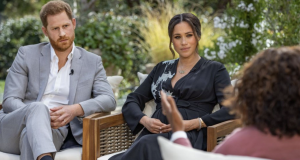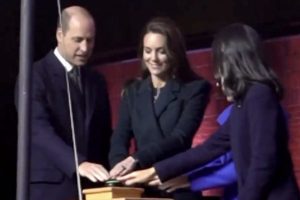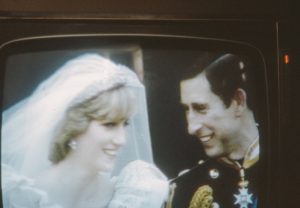London – The first three episodes of the Netflix documentary Harry & Meghan, which aired this Thursday (8) morning, disappointed those who expected direct attacks on members of the royal family for racism or mistreatment of the Duchess of Sussex.
However, the press, especially the tabloid press and the so-called “royal reporters” who followed every step of the monarchy, were not spared either.
Princess Diana appears at various times in the opening episodes of the series. One of the quotes shown is a famous clip of a photographer during a visit to a ski resort where he puts his hand in front of the lens and demands privacy for his children.
Harry and Meghan tell their love story on Netflix
The first episode of Harry & Meghan begins as a sweet love story that shows a cheerful and free young woman who meets and falls in love with the prince via Instagram, even having to wait for him on the first date.
Who’s late for their first date? Harry and Meghan. Volume I: Now Available. pic.twitter.com/SEv8AqGZhR
— Netflix (@netflix) December 8, 2022
The duchess’s friends testify to what she said about her boyfriend, trying to convey the image of a fairy-tale romance and the prospect of a happy life, which, according to the couple, did not come true.
While no direct accusations are made against family members, as in the couple’s 2021 interview with host Oprah Winfrey, where the media was equally attacked, racism, the central theme of the show, soon emerges.
Also read | Press also hurt in Meghan and Harry’s shootout against the Crown
Harry criticized the British media’s relationship with the monarchy. “Royal route” is a group of journalists accredited to follow the activities and travels of royals.
According to Harry, British newspapers give the title of royal correspondent to journalists who follow the royal family to give “legitimacy” to their writing. “And they get paid for it!”
The prince called the plan “essentially an expanded PR arm of the royal family.” It’s an agreement that’s been around for over 30 years.”
“All true news is filtered through all the newspapers on the royal road, most of them tabloids, with the exception of the Daily Telegraph,” he said.
“Everything depends on control, as if the family were to be exploited,” he criticized.
Harry said as a royal it was “his duty to expose this exploitation and bribery that is occurring in the media”.
At various points throughout the three episodes, Harry’s discomfort with what he sees as press interference is notorious. One of the situations he mentioned was the “death of Princess Diana”.Instead of being free to suffer, I was put on public display as part of the royal family.
The Prince reported that the racist attacks against Meghan began before the wedding and expressed anger over the lack of protection of his wife-to-be, the only criticism leveled at the family, although he did not specifically refer to one person.
He remindedEight days after the relationship was announced, she made a statement condemning the racist-toned articles and headlines written by the British press and the “absolute racism” of the posts on social media.
Images from newspaper headlines were shown in the Netflix documentary. One read: “Harry’s daughter has (almost) left Compton.”
Meghan said, “First of all, I’m not from Compton, I’ve never lived in Compton so it’s factually wrong. So why do a Compton investigation?
Harry claimed that the royal family did not understand that Meghan needed protection from racist attacks.
The Duke of Sussex said the royal family questioned why the Duchess should be “protected”. And Saray’s inclination is to “not manifest,” because everything she’s been through has been experienced by others.
He said he had heard from relatives anonymously: “’My wife had to go through this, why should your girlfriend be treated differently? Why should you receive special treatment? Why should it be protected?”
He is said to have replied, “The difference here is the race element.”
This was the most negative reference Harry and Meghan made to family in the first three episodes of the documentary. Even so, it turned out to be cheap, because at least for now, the criticism comes from negligence, not for actions that could constitute deliberate discrimination against the Duchess of Sussex.
Other references were to the formality of family relationships, along with a description of the alienation Meghan felt when she took William and Kate to dinner barefoot and hugging, something unusual for the British, in her opinion.
Harry also threw a thin punch at his father by commenting on the obligation to marry people who fit his family model. She compared herself to her mother, saying she made the decisions “with her heart.”
Meghan’s mom talks about racism in Netflix series
Doria Ragland, Meghan’s ever humble mother, also spoke about discrimination by the media. She said photographers recorded photos of poor and violent neighborhoods in Los Angeles and suggested she lived there, which would be Meghan’s origin.
In the second episode of the Netflix series about Harry and Meghan, the Duke of Sussex talks about the paparazzi’s interest in their relationship and his social media following. And she likens the woman’s abuse to what her mother Diana suffered.
“It’s hard to see another woman I love in my life go through this craziness,” she says. “Hunter against the hunt.”
Elsewhere, Meghan said she came to believe that media attention would dwindle after the wedding.
“At that point, I still believed so strongly that they were telling me ‘it will pass, it will get better,’ which is exactly what they were doing in the beginning,” he said.
“But truth be told, no matter how hard I tried, no matter how good I was, no matter what I did, they would still find a way to destroy me.”
Media coverage of the royal family isn’t always unfair or invasive. Harry apologized in the documentary for one of his unfortunate moments in public life when he donned a Nazi costume at a 2005 costume party.
“It was probably one of the biggest mistakes of my life,” he said. “I was so embarrassed afterwards. All I wanted to do was fix it.”
At the beginning of the first episode, a message says that members of the royal family have refrained from commenting on the series. But both Buckingham Palace and Kensington Palace say they or other members of the Royal Family have not been approached for comment, according to the BBC.
When they arrived Tuesday night to receive a human rights award from the Robert F. Kennedy Foundation in New York, journalists Harry and Meghan were asked to earn money for their families.
The contract with Netflix is estimated at US$100 million.
They didn’t answer, but several British agents highlighted the intriguing question, as what the monarchy does best is to make money using the image of the family, as well as receiving public funds to finance some of its spending despite their wealth.
Anti-monarchy group Republic took the opportunity to criticize the existence of the system, and join the US-republican movement in breaking with everything Harry and Meghan, who continue to use the titles Duke and Duchess of Sussex despite copyright criticism.
May we suggest that Harry and Meghan call for a republic? This would have saved their family a lot of grief in the long run. first two chapters #HarryandMeghanonNetflix it mainly highlights the absurdity of the institution and how people treat it.
— Republic (@RepublicStaff) December 8, 2022
The ghost of racism in the royal family
Even without direct attacks on family members, the racism-centric program comes at a bad time for the British royal family, which has been in a crisis over racial discrimination last week.
Camilla, one of Queen Elizabeth’s companions and now Queen Consort, was forced to resign from her post after engaging in a dialogue with a black activist during a ceremony at Buckingham Palace.
The case occurred on the eve of Prince William and his wife Kate’s planned trip to the United States, which was to be a big event.
To wrap up, on the second day of their Boston tour, Netflix released the first trailer for the Harry & Meghan documentary, which drew attention to the activities of the Prince and Princess of Wales on American soil.
Also read | William and Kate’s US tour marred by racism scandal at Buckingham Palace
The next episodes of Harry & Meghan will premiere on Netflix on December 15.
Coincidentally or not, it’s the day the Princess of Wales will host a Christmas carol ceremony at Westminster Abbey that will be turned into a TV show. The public relations war is not over yet.
Also read | Research reveals that 25 years after her death, Princess Diana is more admired than King Charles and the monarchy
source: Noticias
Mark Jones is a world traveler and journalist for News Rebeat. With a curious mind and a love of adventure, Mark brings a unique perspective to the latest global events and provides in-depth and thought-provoking coverage of the world at large.


